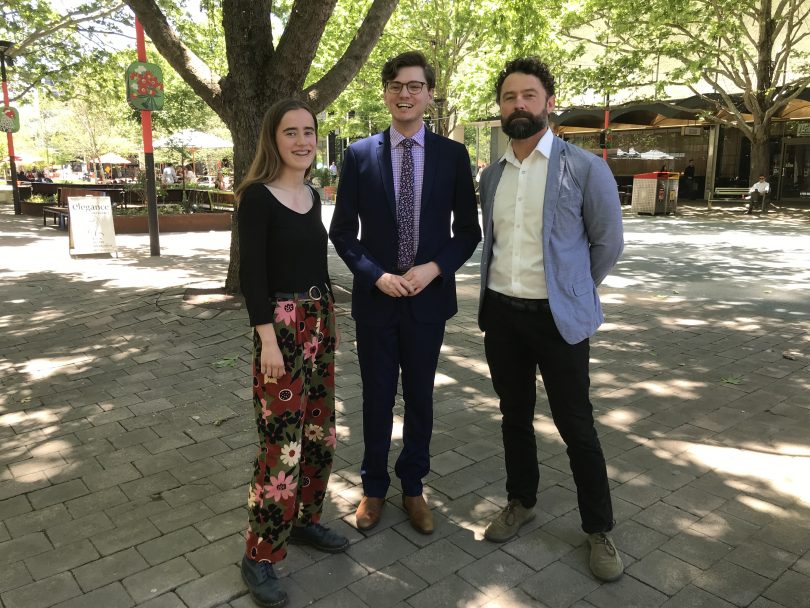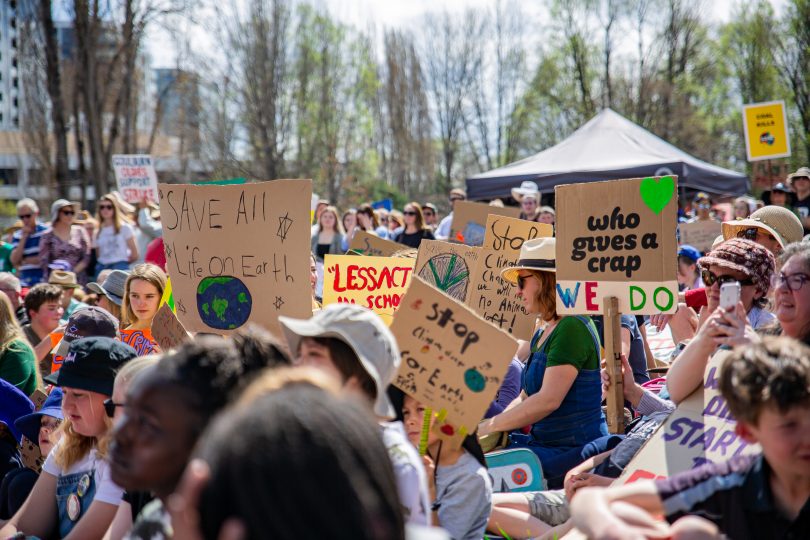
Tara Craemer-Banks (aged 16), ACT Greens spokesperson for young people Johnathan Davis and executive director of the Youth Coalition of the ACT, Dr Justin Barker. Photo: Lottie Twyford.
Lyneham High student Tara Craemer-Banks thinks she should be able to vote in ACT elections.
So do the ACT Greens, who introduced a bill to extend the right to vote to 16 and 17 year olds in the Legislative Assembly today (2 December).
“I do genuinely believe that people of my age are capable of being responsible voters. We’re engaged, and we care about politics, and I think it’s unjust for us not to have a say in the issues that will affect us,” says Ms Craemer-Banks, aged 16.
Of greatest concern to her are climate change, housing affordability and employment.
Not being able to vote makes her feel “powerless”, she says, and while she participates in many political activities such as protesting and attending political party meetings, it’s not enough.
“We can’t shift who’s actually going into government.”

Young people say protesting isn’t enough political participation. They want to vote. Photo: File.
Ms Craemer-Banks is a politically engaged young person, but she says all of her peers, even those less interested in politics, would take the opportunity to vote if they had it.
As she points out, “there are older people who don’t care about politics and voting, too”.
According to Ms Craemer-Banks, the opportunity to learn about voting and the ACT political system would encourage those who may not otherwise engage with it to do so.
Executive Director of the Youth Coalition of the ACT Dr Justin Barker agrees.
“When you’re an adult, you don’t get to systematically address that education gap.”
He says opening voting to young people while they are still at school means they can be provided with a “systematic and standardised education on the electoral system at the time that they’re going to be participating in it”.
“At 18 years old, young people are everywhere. Some are on gap years, some are completing apprenticeships, some are employed or unemployed. There’s no systematic approach to helping them engage with voting.”
At 16, Dr Barker thinks it’s possible.
But he also says there’s a common misconception that young people can’t make sensible decisions.
“Research has now proven that the 16 to 17-year-old age cohort can make informed, confirmed decisions in a rational, unpressured environment.”
Under the gaze of their peers and in highly pressurised situations, he notes that’s not the case. But voting is the former, not the latter.
A recent survey by the Youth Coalition found the majority of young people support extending voting rights.
The ACT Greens have long supported lowering the voting age. ACT Greens MLA Kerrie Tucker first introduced legislation to extend voting to younger people in 1996.
A bill put forward today by Greens spokesperson for young people Johnathan Davis and Greens spokesperson for democracy Andrew Braddock will now go through a public inquiry process before being debated by the Assembly next year.
Mr Davis says he believes democracy is more robust when more people have their say at the ballot box.
“Young people deserve to be represented in the vote and their values deserve to be represented in the Assembly.”
He says young people already handle responsibilities such as getting a drivers license, working and paying taxes, making decisions on their education and medical procedures, and could handle this additional one.
Legislative barriers in the ACT mean voting, including for this young cohort, would be mandatory.
A $20 fine is currently incurred if someone doesn’t vote, but Mr Davis is hopeful this could be lowered to $10.
Mr Davis disagrees with the argument that the Greens only want to lower the voting age to 16 because young people are likely to vote on the left side of politics.
He notes the Canberra Liberals have previously said they have the fastest growing membership of young people in the country and told the Assembly today he commended Canberra Liberals’ MLA Mark Parton for his engagement with young people via the social media platform TikTok.
But as for who Ms Craemer-Banks would vote for, she’s got that figured out too.
“The Greens.”
Original Article published by Lottie Twyford on Riotact.




